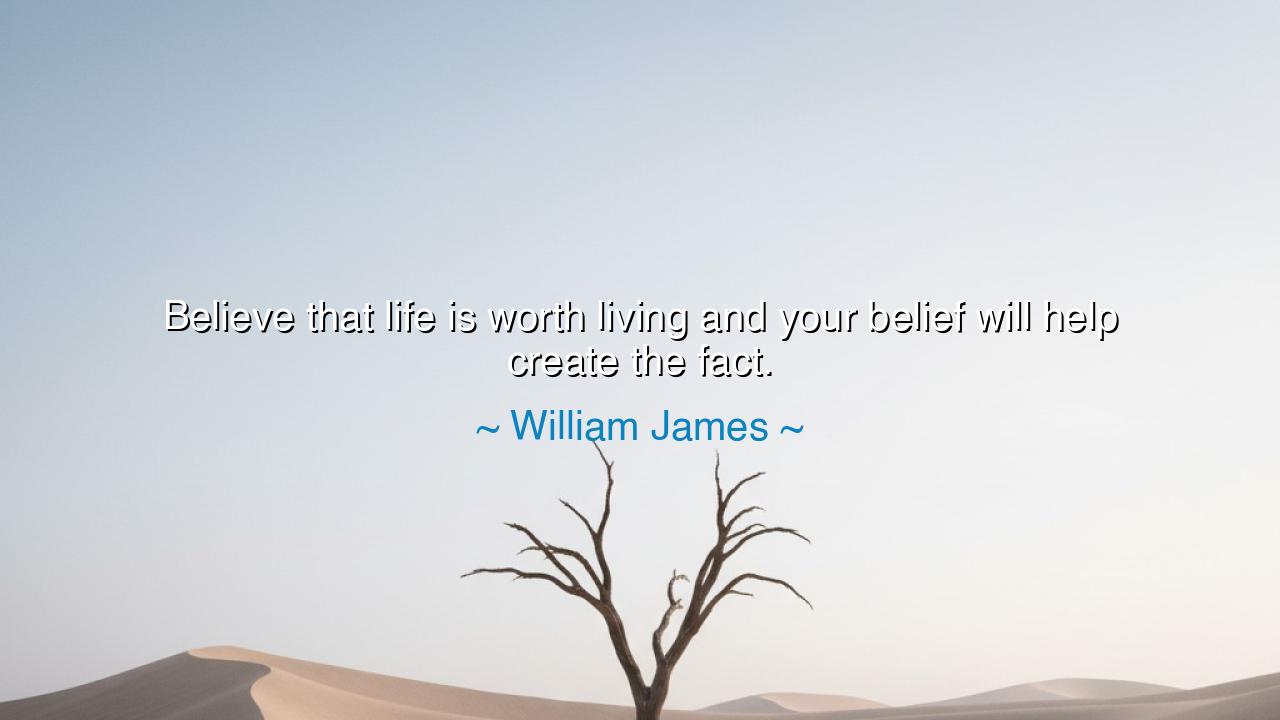
Believe that life is worth living and your belief will help






The words of William James — "Believe that life is worth living and your belief will help create the fact." — carry the voice of a sage who knew the storms of the human spirit. James, father of modern psychology and philosopher of the will, understood that the mind has power not only to interpret reality but also to shape it. His message is not idle optimism but a profound truth: the belief that life is meaningful plants the very seeds of meaning. To see the world as worthy is to summon forth its worth; to decide that life is valuable is to awaken its value.
The origin of this teaching lies in James’s exploration of what he called “the will to believe.” He saw that men and women often stand paralyzed between despair and hope, uncertain whether to commit themselves to life’s journey. In such moments, he declared that belief itself is an act of creation. When the heart chooses to affirm life, reality bends in that direction; opportunities are seen, courage is summoned, strength arises. In this way, belief becomes not illusion, but the very foundation upon which facts are built.
History abounds with examples of this principle. Consider Viktor Frankl, survivor of the Nazi concentration camps. Surrounded by death, stripped of freedom, he wrote that those who endured were often those who clung to a purpose — who believed life was worth living even in the darkest pit. This belief gave them the strength to suffer with dignity, to find meaning in pain, and, for some, to survive where others perished. Frankl’s testimony echoes James’s truth: by believing in life, they helped create the fact of survival.
We see it too in the story of Helen Keller, born deaf and blind. To many, her condition seemed hopeless, her life doomed to silence and darkness. Yet through the tireless teaching of Anne Sullivan, Helen herself came to believe that life was worth living. That belief ignited a transformation: she learned to communicate, to write, to inspire millions. Her life, once thought barren, became a symphony of resilience. Her belief did not erase her limitations, but it created a life of richness and meaning.
The teaching of James is thus heroic and practical: do not wait for proof that life is good before you choose to embrace it. Choose first, with boldness, to believe in its worth. In that choice lies power. When you rise each morning with the conviction that the day has meaning, your eyes will find it. When you walk with the belief that life is sacred, you will discover reasons for reverence in the smallest of things. Belief is the soil; from it springs the harvest of reality.
The lesson for all is clear: despair weakens, but belief strengthens. Doubt may whisper that life is meaningless, but you are not bound to agree. You may answer with your own resolve: “No — life is worth living, and I will live it.” This is not naivety, but courage. For to believe in life when all seems lost is the greatest act of defiance against despair.
What, then, should you do? Begin by cultivating belief as a daily practice. Speak affirmations of life’s worth, even when you feel the opposite. Seek meaning in your actions, however small: in the kindness you offer, in the work you do, in the love you share. Surround yourself with those who also believe, for belief is strengthened in community. And when trials come, recall the wisdom of James: your belief itself can shape the path forward, turning potential into reality.
Thus let this teaching be passed down: the world may appear empty, but belief can fill it; life may seem a burden, but belief can crown it with meaning. If you choose to believe life is worth living, you will help create a life worthy indeed — not only for yourself, but for all who walk in the light of your example.






AAdministratorAdministrator
Welcome, honored guests. Please leave a comment, we will respond soon